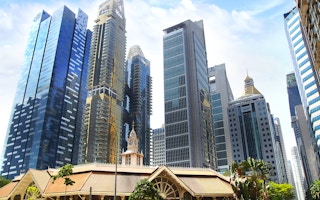Singapore law firm Rajah & Tann has launched a new sustainability practice to advise local and regional clients on environmental, social and governance (ESG) matters.
To continue reading, subscribe to Eco‑Business.
There's something for everyone. We offer a range of subscription plans.
- Access our stories and receive our Insights Weekly newsletter with the free EB Member plan.
- Unlock unlimited access to our content and archive with EB Circle.
- Publish your content with EB Premium.
The full-service law firm is among the first in Singapore to establish a practice dedicated to sustainability, a decision its partners say was made in response to companies’ rising focus on ESG issues.
The practice will be headed by Lee Weilin, partner of Rajah & Tann Singapore’s banking and finance practice.
Lee said that the push towards sustainability in the legal profession is driven by growing social consciousness about climate change and environmental issues, rather than just compliance. She noted that investors and customers are becoming more concerned about sustainability, especially with the Covid-19 pandemic highlighting social inequality and environmental degradation.
Lee will be supported by a multi-disciplinary team of lawyers, including partners Kala Anandarajah, Soh Lip San, and Sandy Foo. The team of specialists will draw from their experience in environment, mergers and acquisitions (M&A), real estate, trade, and infrastructure to advise clients in Singapore and Southeast Asia.
The team will help clients navigate the myriad business and legal considerations for sustainability, with expertise on a range of ESG issues including corporate governance, health and safety, sustainability reporting, environment, anti-bribery and corruption, green and sustainability-linked loans, supply chain, and stakeholder management.
“There’s a growing trend for banks to support sustainable businesses. I’ve seen a lot of sustainability-linked loans in the past two years,” Lee told Eco-Business. She said that the firm’s funds and M&A departments have also seen a growing trend in sustainable impact investment, particularly with private equity and venture funds.
Alongside these industry-led trends, ESG regulations are gradually developing across the region. The Monetary Authority of Singapore (MAS) recently issued their Guidelines on Environmental Risk Management applying to banks, insurers, and fund management companies, which aim to set out sound practices for managing and disclosing environmental risk.
Lee acknowledged that sustainability in the region is still a “nascent” area. “I expect to see this becoming an important part of our revenue growth in the next few years, but for now, I think our motivation is partly altruistic,” she said. “Personally, I find that practicing sustainability is very meaningful.”










